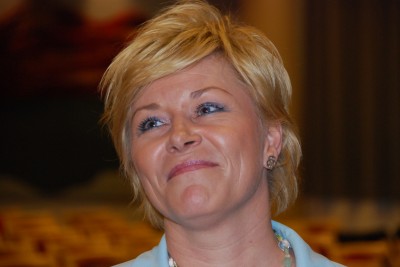Two recent polls conducted by the Norwegian media have shown a sharp decline for Norway’s most conservative party, the Progress Party (Fremskrittspartiet, Frp), which has no doubt been affected by the recent sex scandals that have rocked its leadership.

Frp, which has in recent years topped polls in the country, is down 7 percentage points in a study conducted by research firm Sentio for the newspaper Dagens Næringsliv, now finding themselves with support from just 19.5 percent of Norwegian voters. The embattled party has never fallen so dramatically in a Sentio poll, and received little relief from another survey conducted for Avisenes nyhetsbyrå (ANB), which gave them 20.2 percent of the vote following a 1.1 percentage point drop.
The party’s struggles in the polls are part of a steady recent decline, but also come just after a sex-scandal surrounding the party dominated the country’s media. The revelations began with allegations against Trond Birkedal, a senior party member and former adviser to party leader Siv Jensen, regarding the illicit filming of a minor. Jensen and other senior figures were then revealed to have known about the allegations without reporting them, after which further scandals developed in two cases regarding other party members, one of which also involved minors.
Two polls pile on misery
In ANB’s study, Frp’s downturn, combined with a 2.1 percentage point slide for the Conservative Party, would mean that Norway’s two largest conservative parties would not have a parliamentary majority if the poll result was reflected in an election. Instead, the poll gave the current governing parties – the red-green coalition – an improved majority, as they went forward 2.7 percentage points collectively.
Meanwhile, Sentio’s results did give the potential “blue-blue coalition” a majority. In their study, the Conservative Party is now quite clearly Norway’s largest party, with 28.8 percent of the vote compared to the Labour Party’s 26.6 percent. Even with Frp’s decline, the same outcome in a general election would give the Conservative Party and Frp 85 seats in the Norwegian parliament, while the red-greens would fall 23 from their current total to 63. Labour’s governing partners remain at low levels in the polls – the Socialist Left Party fell 1.2 points to 4.1 percent, although the Centre Party rose 1.1 points to 5.2 percent despite recent setbacks over the loss of local hospitals, and an embarrassing media outburst by their leader that may have been too recent to have been recorded in polling data.
Frp slide benefits Conservatives
Conservative Party leader Erna Solberg was happy with the results, telling Dagens Næringsliv that they “have not been so stably high since the 1980s.” Election researcher and professor Anders Todal Jenssen told news agency NTB that he believed the Conservative Party was benefiting from Frp’s ailing fortunes – and will look on the party as a more likely governing partner if they remain smaller. “It is good for the Conservative Party’s governing project because it is easier for them to handle an Frp that is smaller,” commented Jenssen. “The desire to govern with Frp is bigger the smaller Frp are.”
Frp themselves claimed that they were still satisfied to be in and around 20 percent in the polls. Deputy leader Per Arne Olsen, speaking to newspaper Dagsavisen, admitted that the sex scandal cases were a major cause for their recent poll performances. “It is clear that the so-called Birkedal-case has not been suitable for getting voters to flock to the party,” Olsen conceded.
The Labour Party was happy with the outcome of the ANB poll, despite their relatively poorer performance in Sentio‘s study. Acting parliamentary leader, Martin Kolberg, disagreed with Olsen’s analysis, telling Dagsavisen that Frp’s results were not necessarily caused by their recent troubles. “That was only a trigger factor,” he said. “Normally, there isn’t space for two large right-wing parties in Norway.” He also suggested that “the core of Frp’s politics, with privatization and no to immigration, has lost a grip on public opinion.”
Views and News from Norway/Aled-Dilwyn Fisher
Join our Reader Response if you’d like to comment on this story.

